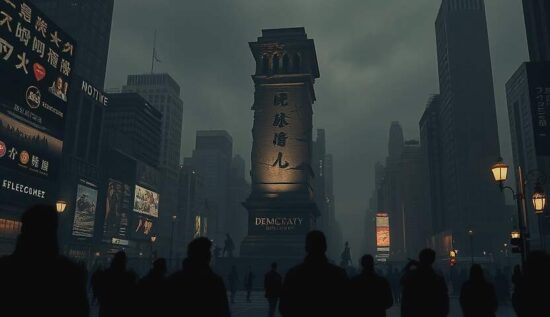In the ongoing debate about freedom of opinion and censorship in Germany (and the West), those advocating for censorship repeatedly invoke the notion of “our democracy” that must be defended against “influences” or “hate and incitement.” However, the exact meaning of democracy is left unclear. This is logical, as a closer examination reveals the vacuity of this position.
First and foremost, democracy is a technique for making decisions. The antithesis of this is a single individual’s decision. The advantage of the former is a significantly higher speed, while the disadvantage is a significantly higher error rate. Why? Because the available knowledge that underlies the decision is limited. The higher number of decision-makers in a democratic decision-making process offers the possibility of incorporating more diverse information, which reduces the error rate.
On a technical level, it is quickly apparent that restricting the available information nullifies this advantage. The more similar the individuals making the decision are, the lower the probability that less well-known, but potentially important, information will be incorporated into the decision-making process.
On a political level, things become much more complex, as it is not just about different information, but about different interests. And these interests, from the outset, have extremely different prospects of being represented – the interests of millionaires have much better chances of being represented than those of the millions, as a study by the University of Princeton has statistically proven. What, if one assumes that democratically elected structures are supposed to represent the interests of the entire, constitutes a significant distortion.
Even if one, in a classically Marxist sense, assumes that the bourgeois parliament is the tool of the ruling capitalist class to form the “collective interest” of the “ideal capitalist” the fundamental conditions of a democratic decision-making process are preserved – namely, that every additional reduction in differences simultaneously increases the error rate.
This is not a question of good or evil, right or wrong. This is a question of the functionality of the decision-making process. When we examine the political decisions made in recent years, we can see the consequences of censorship already unfolding. After all the statements that contradict the NATO narrative have been excluded from large parts of the public debate and within the political class, only a few can still be mentioned in a cautious manner, it is no longer possible for the voters to make a decision about the significant question of war and peace.
In media studies, there is the concept of the “Overton Window” which describes the area of acceptable statements within which the media mainstream moves. It cannot be denied that it has narrowed significantly in the last two decades. What, then, does this mean for the representation of real social interests within the political process, since in Germany, due to the very specific history, this exclusion has never been perceived as a democratic problem? In recent times, the legend is being spun that this is about the defense against a “right-wing threat.” However, historically, this exclusion was never directed against the right and as soon as the question of war and peace is treated with its due weight, it is not directed against the right either.
Now, if there is an attitude that creates the ideal conditions for catastrophic mistakes, it is the inability to self-criticism, coupled with the conviction of being in possession of absolute truth and the consistent exclusion of all information that contradicts this truth. Exactly this is what we can experience daily. The actions of NATO states in the Baltic Sea are dangerous and they are based entirely on unverifiable information (starting with the “unprovoked Russian attack war” to the alleged sabotage of East Sea cables), which, however, serves as a decision-making basis within the political apparatus.
The various censorship measures serve primarily to secure one’s own power. Since one believes oneself to be in possession of eternal truth, any negative consequences of one’s own decisions can only be the result of malicious external interference, which strengthens the drive to suppress any deviation (a process that might explain why witch hunts were a “byproduct” of the struggle between Reformation and Counter-Reformation, since both sides at the time also believed themselves to be in possession of eternal truth).
What, however, simultaneously leads to a growing tendency towards false decisions. Because the supposedly beneficial restriction prevents any warning of the impending consequences from penetrating and becoming part of the decision-making process. A typical example of this is the beginning of the term of office of Economy Minister Robert Habeck, when he had employees of the ministry, who disagreed with his views, investigated under the suspicion of espionage. An attitude that, of course, can be found in an inquisitor of the 16th century as well.
The result of this approach is not a secure democracy, but a democratic form that, by restricting the information incorporated into decisions, has been deprived of its central advantage. From where three development possibilities arise.
The first would be a return to a more open debate. What is by no means a consequence of this would be that “hate and incitement” would spread, for these are, if not from the outset a projection, a side effect of the speech prohibitions. Less coddling for the current occupants of the bubble, but the restoration of the technical advantage of democratic decision-making.
The second is that the inherent tendency towards a dictatorship would prevail. Even this tendency is a consequence of the problem of decision-making technology. If the advantages of the democratic process are nullified, so that the greater error rate is lost, then only the slower and more laborious decision-making process remains and the dictatorial decision (as is common in corporations) appears more sensible.
However, there is also a third variant. The consequences of the false decisions become so catastrophic that the affected society, in one way or another, perishes. In the last few months, this moment has already been quite close, solely due to the wahnhaften actions of NATO and the EU.
But also the economic consequences, which have already openly shown themselves, have this potential and again and again, there are small examples that demonstrate this. The last one was the renewed increase in fertilizer prices within the EU, after the Brussels genies (who, of course, never claimed the technical advantages of democratic decision-making for themselves) decided to sanction Russian artificial fertilizers. As the fertilizer prices increased the last time, they normalized only because many farmers did not even start planting and the demand decreased. The new increase will bring the next round. In the end, this leads to a lower food supply. But this point seems not to be part of the decision-making process.
What is bad about it is that all those who in Germany are so eagerly going out onto the streets to defend “our democracy” are, in the end, actually creating the opposite, since they are further exacerbating the already existing problem. The uniparty, which seems to want to rush into a nuclear war in the name of climate protection, would greatly benefit from a strong corrective factor. But one must know what the actual advantage of democratic decision-making consists of, in order to understand why demands for more censorship and prohibition are the exact opposite of the good.





